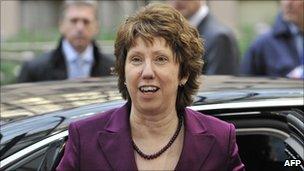Q&A: EU External Action Service
- Published

Lady Ashton wants the EEAS to have geographical and gender balance
The EU's new diplomatic service - the European External Action Service (EEAS) - was launched quietly on 1 December 2010, without any fanfare.
It is one of the key innovations under the EU's Lisbon Treaty, but there were tough negotiations over its structure and a deal was not reached until 21 June.
The EU foreign policy chief, UK peer Baroness Ashton, got European Commission support for her original blueprint, but the European Parliament argued successfully for changes to make the EEAS appointments and budget more transparent.
Does the EU need its own diplomatic service?
What role will the EEAS play in EU defence and security policy?
How will the EEAS be organised and what will it cost?
Apart from Lady Ashton who are the top officials?
Will the European Parliament - the only directly elected EU institution - have any power over the EEAS?
Will there be any duplication of the Commission's work?
How has Lady Ashton influenced EU foreign policy so far?